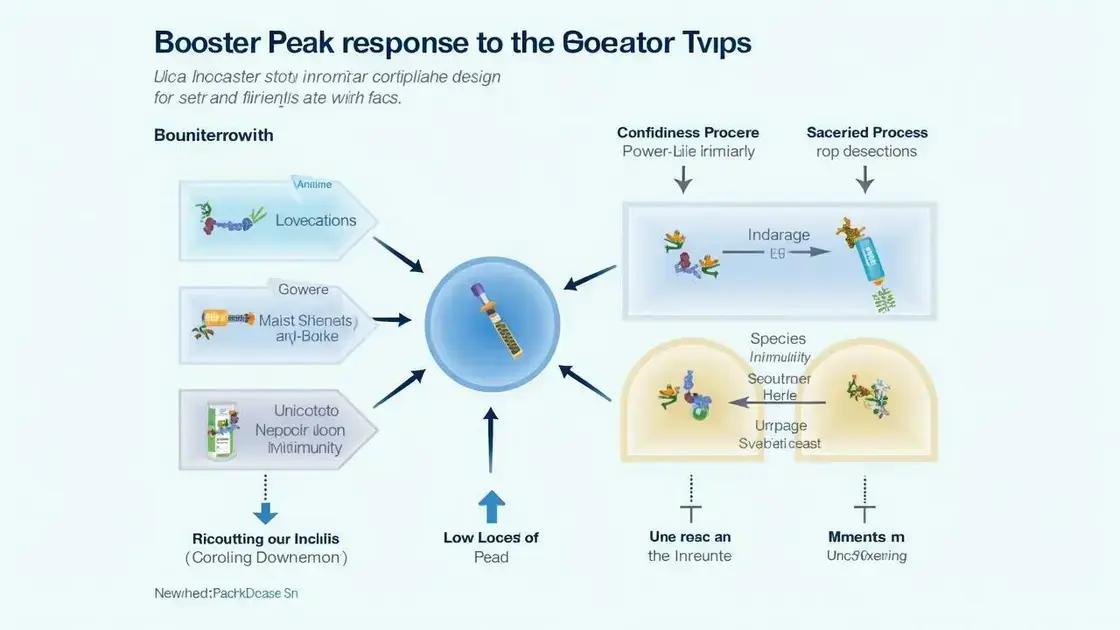The side effects of booster shots can include soreness, fatigue, headaches, and mild fever, typically lasting a few days. It’s crucial to monitor symptoms, rest, stay hydrated, and seek medical help for any severe or persistent reactions.
The side effects of Booster Peak can vary from person to person, making it essential to understand what to expect. Many individuals report experiencing symptoms that may range from mild to severe. Understanding the potential side effects and appropriate management strategies is crucial for maintaining your health. In this article, we will delve into the nature of these side effects, discuss common reactions, and provide guidance on when to seek medical assistance.
Understanding Booster Peak

Understanding Booster Peak is essential for anyone considering vaccination. Booster Peak refers to the heightened immune response that occurs after receiving a booster dose of a vaccine. This additional dose aims to enhance and extend the protection provided by the initial vaccinations. It is particularly important in ensuring that the immune system remains prepared to fight off specific pathogens, effectively improving overall immunity.
How Booster Vaccines Work
When you receive a booster vaccine, your body re-engages its immune system, recognizing the components of the vaccine. This process helps reinforce your immune memory, making it more effective in responding to future exposures. Your body will produce more antibodies, which are proteins that help in identifying and neutralizing harmful agents such as viruses and bacteria.
Why Are Booster Shots Necessary?
Over time, the immunity gained from initial vaccinations may wane, reducing protection against diseases. Booster shots help restore and prolong this immunity, especially against emerging variants or new strains of diseases like COVID-19. They play a crucial role in public health by minimizing the risk of outbreaks.
What to Expect After a Booster
After receiving a booster dose, some individuals may experience mild reactions. Commonly reported effects include soreness at the injection site, fatigue, headaches, and mild fever. These reactions are typically short-lived and indicate that the body is responding as intended to the vaccine. However, understanding these reactions can help individuals better manage their expectations and health after vaccination.
Common Side Effects of Booster

After receiving a booster dose, patients may experience several common side effects. These side effects are usually mild and indicate that the body is responding to the vaccine. Understanding these effects can help individuals prepare for what to expect.
Injection Site Reactions
Many people report experiencing soreness, redness, or swelling at the injection site. This reaction is normal and usually subsides within a few days. Applying a cool compress can help alleviate discomfort.
Fatigue
Feeling tired after a booster shot is another common effect. This fatigue might last for a day or two and is often a sign that the immune system is working hard to build defense against pathogens.
Headaches and Muscle Pain
Some individuals may develop mild headaches or muscle aches. These symptoms are generally transient and can be managed with over-the-counter pain relievers, such as ibuprofen or acetaminophen.
Mild Fever and Chills
A mild fever or chills can occur after receiving a booster shot as the immune system responds. While it may be uncomfortable, it typically resolves on its own within a few days. Staying hydrated and resting can help during this time.
What to Do if You Experience Side Effects

Experiencing side effects after receiving a booster shot can be concerning, but there are effective ways to manage these symptoms. Here are steps to take if you encounter any side effects.
Monitor Your Symptoms
Keep track of how you’re feeling in the days following your booster shot. Log any reactions, noting their intensity and duration. This information can be useful if you need to consult a healthcare provider.
Rest and Hydrate
One of the best ways to recover from mild side effects is to get plenty of rest and drink fluids. Staying hydrated helps your body cope with fatigue and supports the immune system.
Treating Mild Symptoms
If you experience discomfort like headaches or muscle pain, over-the-counter medications such as ibuprofen or acetaminophen can help. Always follow the dosage instructions on the packaging.
Seek Professional Advice
If symptoms persist or worsen, it is essential to contact your healthcare provider. Explain your situation clearly, detailing what symptoms you are experiencing and for how long. They can provide guidance and determine if further action is needed.
When to Seek Medical Help

Knowing when to seek medical help is crucial after receiving a booster shot. Although most side effects are mild and temporary, some symptoms may require professional attention.
Persistent Symptoms
If you experience symptoms such as fever, fatigue, or pain that last longer than a few days, it is important to contact your healthcare provider. Persistent issues can be a sign of a more serious reaction.
Severe Allergic Reactions
Watch for signs of an allergic reaction, which may include difficulty breathing, swelling of the face or throat, or a rapid heartbeat. If you experience any of these symptoms, seek emergency medical help immediately.
Unexplained Symptoms
If you develop symptoms that were not mentioned previously, such as severe abdominal pain, rash, or neurological problems, you should consult a healthcare professional. Unexplained changes in your health should be addressed.
Emotional Distress
It is normal to feel anxious about vaccine side effects. However, if feelings of distress or anxiety interfere with your daily life, consider talking to a mental health professional. They can help you cope with vaccine-related fears.
In Summary: Understanding Booster Peaks and Their Side Effects
Booster doses are essential for maintaining and enhancing immunity against diseases. The side effects of receiving a booster shot are generally mild and indicate that your immune system is responding effectively.
By understanding common side effects, knowing how to manage them, and recognizing when to seek medical assistance, you can ensure a smoother experience with your booster shot. Whether it’s monitoring symptoms or staying informed about what to expect, being proactive is key to your health.
Your health and safety are paramount, and remaining educated about booster shots will empower you to take the necessary steps for your well-being.
FAQ – Frequently Asked Questions About Booster Shots
What are the common side effects of a booster shot?
Common side effects include soreness at the injection site, fatigue, headaches, and mild fever. These effects are typically short-lived.
How can I manage side effects after receiving a booster?
Rest and hydrate are essential. Over-the-counter medications like ibuprofen can help alleviate pain and discomfort.
When should I seek medical help after a booster shot?
Contact a healthcare provider if you experience persistent symptoms, severe allergic reactions, or unexplained health changes.
Is it safe to receive a booster shot?
Yes, booster shots are safe and important for maintaining immunity. Most side effects are mild and temporary.
What should I do if I have concerns about my booster shot?
If you have concerns, it’s best to discuss them with your healthcare provider, who can provide personalized advice.
Can I experience different side effects after each booster shot?
Yes, individuals may experience varying side effects with each booster. It’s important to monitor your reactions and report any concerns.













